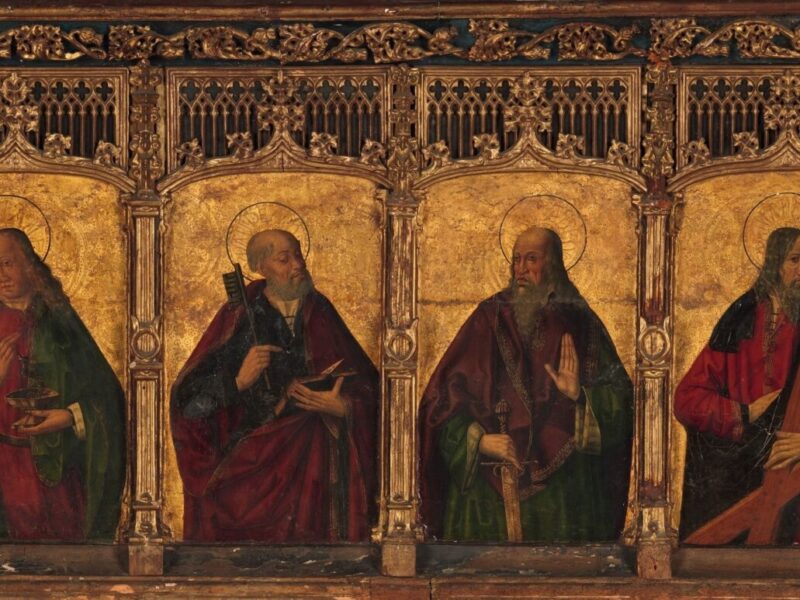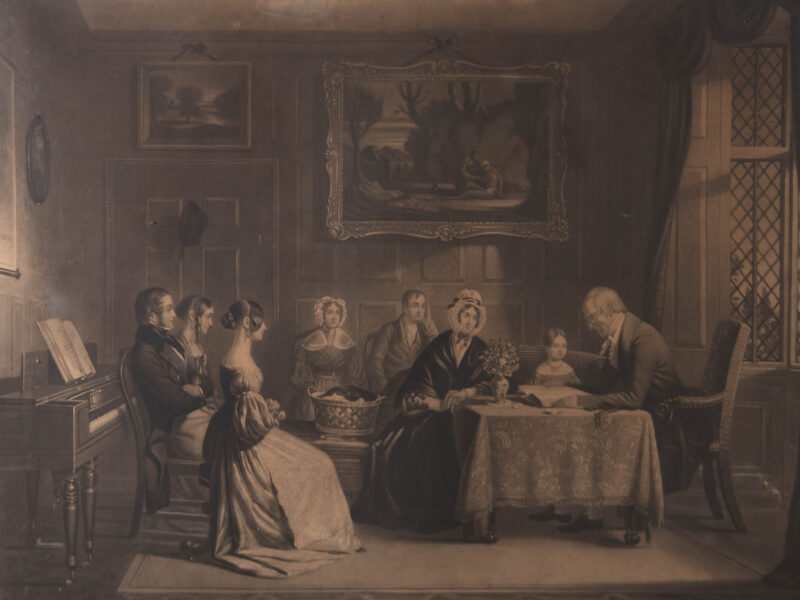Saint Thomas and the Forbidden Birds. By James Matthew Wilson. Grove Village, IL: Word on Fire, 2024. 128 pp. $24.99 (hardcover).
The current state of poetry in our day is marked by its unanchored and erratic character. As an art form, poetry stands isolated like an unfamiliar relative at the family reunion. We do not know who invited him, or how he even knew about the party, yet here he stands—and few want to engage in the awkward conversation that will inevitably ensue when trying to get to know him and understand our blood connection several steps removed. This does not mean that there aren’t enough writers creating poetry. But it may be what they create and why that makes it so aloof and impenetrable.
The truth is that poetry is wildly eccentric, though not dangerously schizophrenic. Many journals and volumes sit in published obscurity to audiences unwilling, and sometimes unable, to read them. Wordsworth’s and Coleridge’s project to get poetry in the hands of the people by speaking directly to the people is, by some, deemed too pedantic for many poets today, who would rather speak to each other than to the reading public. Ever since Modernism’s successful effort to break with all tradition, not only with social institutions but even with the coherence of language, the poet has moved from a central if misunderstood figure adorned in alternating shades of religious power to a hermit unromanticized and muttering an arcane tongue. Some books of poetry sensationalize with their novel and novelizing verse qua prose. Others confuse in their phrasal obscurity and strange reverence of white spaces on the page. Few seem to move with wisdom and eloquence, speaking in a form recognizable to Chaucer and Sydney and with meaning as relevant to the ancient Hebrews as to twenty-first century Americans. In an intellectually lightweight and aesthetically bankrupt age, James Matthew Wilson’s most recent volume belongs to the latter few.
Wilson’s reputation as a man of letters has already been well established, and I strongly doubt he has yet to reach his zenith. As the Cullen Foundation Chair in English Literature and the founding director of the MFA program in creative writing at the University of Saint Thomas, he is intentionally imprinting a generational mark on future writers eager to bring order and peace to literature. This, his fourth volume of poetry, adds to a growing corpus of formalist art and Catholic criticism and has, I believe, the potential to be his most well received yet.
As he argues in The Fortunes of Poetry in an Age of Unmaking (Wiseblood Books, 2015), the religious medium of poetry can restore the irreligious to a sense of enchantment and sublimity about the world and turn their attentions to things permanent and spiritual. This argument is far less Matthew Arnold and more John Henry Newman. Poetry should temporarily anchor us to the skies from a chaotic earth, drawing heavenly strength from its loftiness. As we slip away from the world in the imagination, the poet should not revel in chaos but rise above it. He should imbue us with a vision, fortifying us with the virtues to confront it.
Because Wilson is a devoted student of form, it is appropriate to mention it here as one of his finest strengths. The tight structure of each line and the rhythmic and even meter give readers confidence that they are in able hands, strong enough to lead us on the imaginative journey. Like Virgil leading Dante through the underworld, Wilson has been here before—and he knows the way through. One is struck by the natural movement of each line in a conversational register, as if poetry must be written into the fabric of all prose. The rhyme is punctuated but never overpronounced, again providing the ease of movement through the text. This is not to say that the wording is too simplistic for the sophisticated nor too complex for the uninitiated. Rather, the language feels proverbial, as if drawn from the wisdom of Solomon or the parables of Christ. Familiar forms like the sonnet and blank verse and modifications of terza rima make their appearance, as do a number of nonce poems. Thus, we view a wide sampling of prosody, never simply as a flexing of the poet’s powers but as a revelation of new facets of the world through different lenses.
In every piece is the patient hand of an apprentice become master, a mature scribe fully confident in his energies, unattracted by the empty praise of the avant-garde, unencumbered by the vicious politics of the counter-culturalists. He writes primarily to his personal interests and observations rather than merely catering to an audience, and his interests reveal a soul shaped by classical transcendentals and Christian virtues—as if he were speaking not only to us but beyond us, to the generations who will later learn his name, to the angelic chorus, even to the throne of heaven submitting his artistic offering.
In this way, the poet sharpens his vision and pierces into the heart of reality, merging physical and metaphysical. His subjects are various, as he explores a nature serene and surreal without sentimentalism, depicts the corruption of the city without cynicism, hopes in the endurance of civilization without triumphalism. More acutely, he handles every subject with the care of a wise elder seeking to illuminate the hidden secrets of the world to those gathering at the city gates. Many poems even conclude with an epigrammatic finality; instead of leaving us in aporia, as so many modern poems do, Wilson appears to believe that the business of poetry is too serious, perhaps even too sacred, to do anything less than reveal some truth, no matter how small. From St. Thomas’ contemplation of sin, to the poet’s reminiscence of the “upside-down, pineapple strangeness” of growing up in Australia, to his son’s longing to write a book, all speak to this aesthetic power, a knowledge not of the head but of the imagination. As he states in “Sunlight,” “Thus does the minute judge the hour, / Dismissing that primordial truth / That only speaks with figural power.” By picturing the world in verse, we see more than may be understood philosophically.
Yet it is philosophy and theology that undergird the foundation of Wilson’s poetics and frees him to create meaningful art. Like his teacher, the angelic doctor who rounds these verses, Wilson leads logically through an argument wrapped in an experience where we encounter a truth. When written well, poetry should convict—not with the didactic thrust of the sermonizer but with the sermon’s shared interest in using truth to move us to goodness. And while a good sermon will give some attention to the beauty of rhetoric, the poem has no rhetoric if not beauty.
However, the beauty inherent in these poems does not mean that each piece is full of sweetness and light. Sudden, stark representations like “From The Awful Disclosures of Maria Monk” and “Walking in Dresden” confront the satanic, secret sins frequently exposed by modern media but so often ignored by the Church. Others like “Sloth” highlight the quiet evils of omission not only veiled but often unrecognized. “Ambition” is one of these piercing poems, drawing on the images of Dante and the theology of St. Thomas. It holds a mirror to our self-deception that would posture desire for fame or worldly success as a useful good. Wilson’s target in these several poems is the faithless faithful, those shadowed in the choir who know the good and do not do it. As the volume’s epigraph asks us, “The Son of man, when he cometh, shall he find, think you, faith on earth?” (Luke 18:8). Will those entrusted with the very oracles of God use their knowledge to be holy and to live sacramentally rather than as the rest of the world?
That burden to be faithful weighs strongly throughout. We prologue with an address “To an Unborn Child.” This piece sets the somber tone of the collection, initiating a road of mourning. Yet as heavy as it feels, the poem ends on a note of anticipation, as if salvation is sure to come after the long night of suffering. This message is paradigmatic for the book as a whole, showing us the storied radiance of Wilson’s “battered things.”
Winding through the text, we see the outline of that road come to light. Part I spends most of its attention on the poet’s homecoming to Michigan. Having been away so long, he relearns the rural haunts of his youth, returns to his local church, and walks the unreal highwire between same and different, between memory and change. Part II is a call to wisdom, if not repentance, to a Christian culture allowing itself to become corrupted by the world. The eponymous poem centers the book; it depicts the struggle of contemplating holiness, knowing God by rejecting his opposite, where the knowledge only brings to light increasing awareness of one’s own helpless depravity. Part III is the response to such a critique. For it is not enough to damn the world if we do not fill it with beauty. Here we read addresses to saints and biblical figures, contemplations of philosophy, and expositions of theology, which infuse the unmistakable notes of loss with overtures of hope. The volume concludes with a final coda, a valedictory poem where the author painfully says farewell to his home. Here we end as we began, in the tension between sorrow and faith, knowing the start of a new chapter means the end of another. Thus does Wilson highlight the very essence of the Christian journey, negotiating two worlds through a complex discourse of the fallen yet redeemable human condition.
In his essay “T.S. Eliot: Culture and Anarchy” (Wiseblood Books, 2024), Wilson echoes Eliot’s concern that we risk confusion when we conflate the roles of religion and literature. Religion is our most direct route to God. Poetry points the way to the sacraments, which, while also poetic, are the indispensable vehicles of God’s grace. A Christian literature, therefore, is not a replacement for the religious life expressed in experiences like participation in a local church; what it does, however, is illuminate the value of being part of a congregation by prompting us to see the transcendent beauty instead of a mere dutiful utility in such an act. As broken people this side of Paradise, we lack the joyful certainty of being, unable to conceive of the space empirical and metaphysical once occupied together. Seeing with faith, therefore, means seeing with a consecrated imagination. Wilson restores to us a comic vision of poetics and its significance in contemporary literature by providing luminous examples of poetry writ well. Perhaps even more importantly, he restores the power of poetry to speak theologically by recalling to our minds our visceral memories of Eden weighing us down and buoying us upward through the streets of Babylon, painting us an elegant portrait of the beauty of battered things.





'Book Review: “Saint Thomas and the Forbidden Birds”' has no comments
Be the first to comment this post!